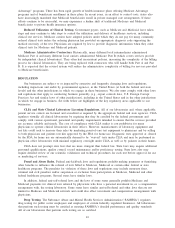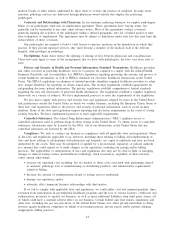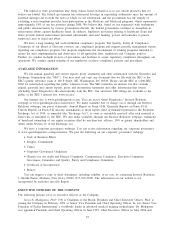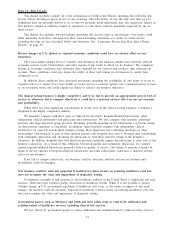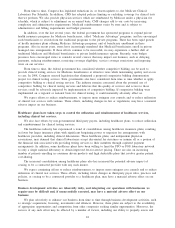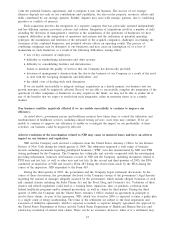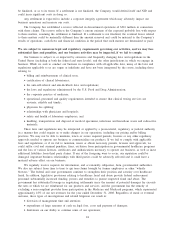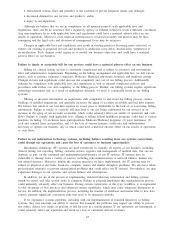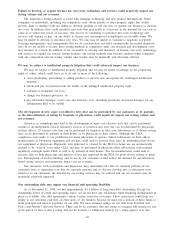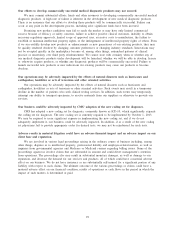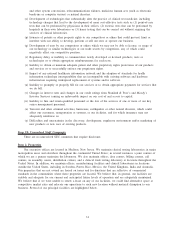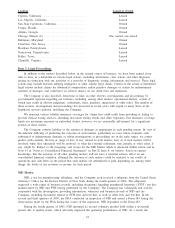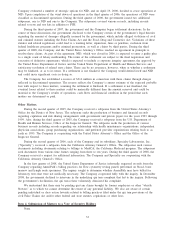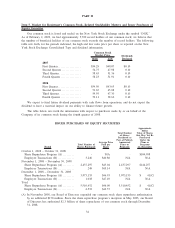Quest Diagnostics 2008 Annual Report Download - page 37
Download and view the complete annual report
Please find page 37 of the 2008 Quest Diagnostics annual report below. You can navigate through the pages in the report by either clicking on the pages listed below, or by using the keyword search tool below to find specific information within the annual report.•enforcement actions, fines and penalties or the assertion of private litigation claims and damages;
•decreased demand for our services and products; and/or
•injury to our reputation.
Although we believe that we are in compliance, in all material respects, with applicable laws and
regulations, there can be no assurance that a regulatory agency or tribunal would not reach a different conclusion.
Any noncompliance by us with applicable laws and regulations could have a material adverse effect on our
results of operations. Moreover, even when an investigation is resolved favorably, the process may be time-
consuming and the legal costs and diversion of management focus may be extensive.
Changes in applicable laws and regulations may result in existing practices becoming more restricted, or
subject our existing or proposed services and products to additional costs, delay, modification, withdrawal or
reconsideration. Such changes could require us to modify our business objectives and could have a material
adverse effect on our business.
Failure to timely or accurately bill for our services could have a material adverse effect on our business.
Billing for clinical testing services is extremely complicated and is subject to extensive and non-uniform
rules and administrative requirements. Depending on the billing arrangement and applicable law, we bill various
payers, such as patients, insurance companies, Medicare, Medicaid, physicians, hospitals and employer groups.
Changes in laws and regulations could increase the complexity and cost of our billing process. Additionally,
auditing for compliance with applicable laws and regulations as well as internal compliance policies and
procedures adds further cost and complexity to the billing process. Further, our billing systems require significant
technology investment and, as a result of marketplace demands, we need to continually invest in our billing
systems.
Missing or incorrect information on requisitions adds complexity to and slows the billing process, creates
backlogs of unbilled requisitions, and generally increases the aging of accounts receivable and bad debt expense.
We believe that much of our bad debt expense in recent years is attributable to the lack of, or inaccurate, billing
information. Failure to timely or correctly bill may lead to our not being reimbursed for our services or an
increase in the aging of our accounts receivable, which could adversely affect our results of operations and cash
flows. Failure to comply with applicable laws relating to billing federal healthcare programs could lead to various
penalties, including: (1) exclusion from participation in Medicare/Medicaid programs; (2) asset forfeitures; (3)
civil and criminal fines and penalties; and (4) the loss of various licenses, certificates and authorizations
necessary to operate our business, any of which could have a material adverse effect on our results of operations
or cash flows.
Failure in our information technology systems, including failures resulting from our systems conversions,
could disrupt our operations and cause the loss of customers or business opportunities.
Information technology (IT) systems are used extensively in virtually all aspects of our business, including
clinical testing, test reporting, billing, customer service, logistics and management of medical data. Our success
depends, in part, on the continued and uninterrupted performance of our IT systems. IT systems may be
vulnerable to damage from a variety of sources, including telecommunications or network failures, human acts
and natural disasters. Moreover, despite the security measures we have implemented, our IT systems may be
subject to physical or electronic break-ins, computer viruses and similar disruptive problems. We also have taken
precautionary measures to prevent unanticipated problems that could affect our IT systems. Nevertheless, we may
experience damages to our systems, and system failures and interruptions.
In addition, we are in the process of implementing standard laboratory information and billing systems,
which we expect will take several years to complete. Failure to properly implement this standardization process
could materially adversely affect our business. During system conversions of this type, workflow is re-engineered
to take advantage of best practices and enhanced system capabilities, which may cause temporary disruptions in
service. In addition, the implementation process, including the transfer of databases and master files to new data
centers, presents significant conversion risks that need to be managed carefully.
If we experience systems problems, including with our implementation of standard laboratory or billing
systems, they may interrupt our ability to operate. For example, the problems may impact our ability to process
test orders, deliver test results or perform or bill for tests in a timely manner. If our operations are interrupted, it
could adversely affect our reputation and result in a loss of customers and net revenues.
25



